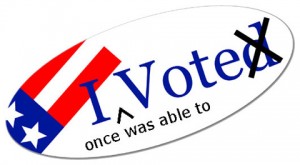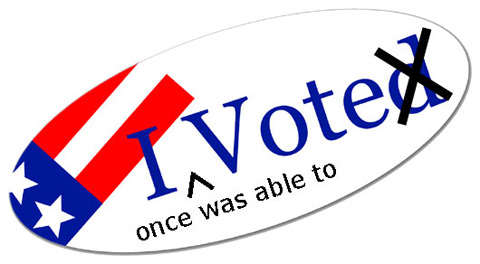 In 2011, the General Assembly passed a controversial voter ID law over the objections of many civil rights, community, labor and open government groups concerned about its impact on voting rights for the poor, the elderly, racial minorities and other vulnerable groups. In seeking to mitigate the potential harm of this law, a House committee yesterday passed a “reform” bill, H-5776A, that could potentially leave even more Rhode Islanders unable to vote in the next election.
In 2011, the General Assembly passed a controversial voter ID law over the objections of many civil rights, community, labor and open government groups concerned about its impact on voting rights for the poor, the elderly, racial minorities and other vulnerable groups. In seeking to mitigate the potential harm of this law, a House committee yesterday passed a “reform” bill, H-5776A, that could potentially leave even more Rhode Islanders unable to vote in the next election.
The 2011 law established a two-step process: a variety of photo and non-photo IDs would be considered acceptable identification in 2012, but more stringent photo-ID-only requirements would take effect for elections in 2014. This year, Rep. Larry Valencia introduced a bill to repeal the statute in its entirety. Instead, House Judiciary Committee approved a “compromise” purportedly designed to “freeze” the law in its 2012 form so that qualified voters would not be disenfranchised by implementation of the stricter photo ID requirement next year.
While less than ideal, passage of such a bill would have been an important and positive step. Unfortunately, that is not what the approved bill does.
The law approved two years ago specified certain forms of acceptable ID, but also granted the Board of Elections the ability to adopt regulations adding other forms of ID to the list. This legislation eliminates that authorization, and instead allows only three forms of non-photo ID – a birth certificate, social security card or government medical card – and seven specified forms of photo ID. This actually reduces the number of IDs that would be acceptable in 2014 under the current law and regulations. For example, the Board’s list includes employee photo IDs, public housing IDs, and current utility bills as acceptable documents. Though commonly accepted in the voter ID laws of other states, they would no longer be allowed under this bill.
More concretely, here are the numbers: In 2012, voters could present 23 forms of identification at the polling place. In 2014, if “photo ID” took effect, 13 forms of identification would be acceptable. Under this bill, however, only 10 forms of identification will be acceptable in 2014. In terms of the documents accepted, this would make Rhode Island one of the most restrictive states among those with non-photo voter ID laws.
In short, the bill is not a “freeze” of the current law; it instead eliminates numerous forms of ID that were accepted in 2012. The bill is thus likely to have little positive impact on the people and groups facing the greatest possibility of disenfranchisement next year, and may negatively impact others whose currently legitimate forms of ID, photo and non-photo, will now be deemed invalid.
However inadvertently, this bill appears to do the opposite of what was intended. We fervently hope that, in accordance with the vast majority of other states with non-photo ID laws, the House will instead amend the bill to allow the use of IDs that were acceptable in 2012 and avoid the unnecessary disenfranchisement of qualified voters in 2014.

